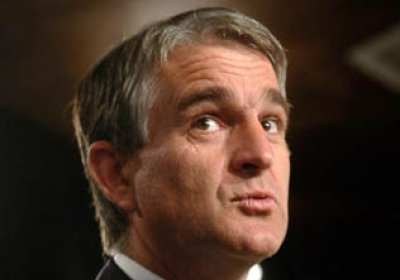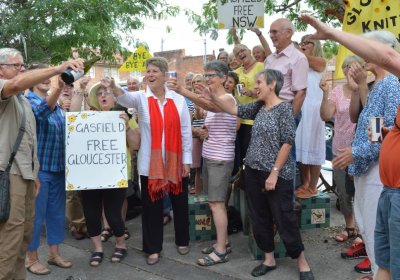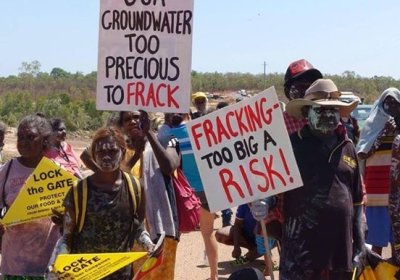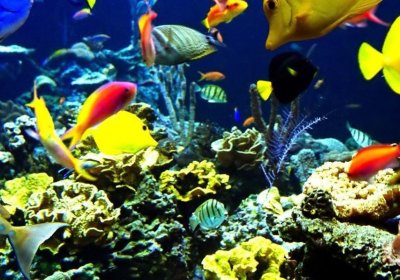Anti-coal seam gas (CSG) activists took direct action on March 2 to prevent Transpacific Waste Water from accepting waste water from AGL's coal seam gas operations in Camden.
Members of the Knitting Nannas Against AGL, CSG Free Western Sydney, Stop CSG Sydney, Stop CSG Penrith, Stop CSG Camden, Stop CSG Blue Mountains and Stop CSG Hawkesbury showed their concern about Transpacific's handling of AGL’s waste water by blockading their trucks.
Gas
What do politicians do after leaving parliament to earn a few more dollars? They go and work for gas and coal companies.
• Former Nationals leader and Deputy Prime Minister John Anderson became chair of Eastern Star Gas — the company behind the Narrabri Gas Project now owned by Santos — about 2 years after leaving politics.
• Former National's leader and Deputy Prime Minister Mark Vaile became a director and then chair of Whitehaven coal.
 Hundreds of environmental protestors made their voices heard against coal and coal seam gas (CSG) mining over the weekend of February 20 and 21.
In the Pilliga, more than 300 people defied a police roadblock to protest the construction of Santos' Leewood waste water treatment facility and in the Leard State Forest a group of about 30 people blockaded the gates to Whitehaven and Idemitsu's Tarrawonga coal mine.
Protest in the Pilliga
Hundreds of environmental protestors made their voices heard against coal and coal seam gas (CSG) mining over the weekend of February 20 and 21.
In the Pilliga, more than 300 people defied a police roadblock to protest the construction of Santos' Leewood waste water treatment facility and in the Leard State Forest a group of about 30 people blockaded the gates to Whitehaven and Idemitsu's Tarrawonga coal mine.
Protest in the Pilliga
 Five climate guardian angels were arrested by police on February 9 while blockading the road to Santos' Leewood wastewater facility in the Pilliga forest near Narrabri in north-west New South Wales.
Five climate guardian angels were arrested by police on February 9 while blockading the road to Santos' Leewood wastewater facility in the Pilliga forest near Narrabri in north-west New South Wales.
Protesters opposing a coal seam gas (CSG) wastewater plant in northern NSW say they will not let police use of pepper spray deter them from their fight against Santos' plans to drill up to 850 CSG wells in the Pilliga.
The Pilliga forest is a vital recharge area for the Great Artesian Basin, which forms the lifeblood of eastern Australia.
As part of its CSG plans, Santos is building a wastewater treatment works at Leewood, which was approved without an environmental impact statement and without public consultation.
“Coal seam gas in New South Wales is dead in the water”, Julie Lyford, spokesperson for Groundswell Gloucester, said after AGL announced on February 4 it was quitting Gloucester.
AGL had planned to drill at 300 sites in a geologically complex and rich farming region north-west of Newcastle. It had been facing fierce opposition for conducting tests in the Gloucester region under PEL 285.
The decision has been welcomed by anti-coal seam gas (CSG) campaigners across NSW. AGL's licence was due for renewal on February 22.
Three Knitting Nannas Against Gas were arrested on January 18 after chaining themselves to the gates of the Santos Leewood water treatment plant near Narrabri.
The Northern Territory government rejected an application to explore for unconventional gas in Watarrka National Park, also known as Kings Canyon, and Coomalie on the edge of the Litchfield National Park, on November 25.
The Traditional Owners have been fighting to protect the areas from fracking for three years. More than 90% of the Northern Territory is covered by gas exploration licences, or applications for fracking exploration.
The battle to save land and water in north-west NSW's Liverpool Plains, from coal and coal seam gas continues to be fought by Aboriginal communities, farmers, local councils and environmentalists.
People in Tamworth, Moree, Narrabri, Boggabri, Gunnedah, Quirindi and Toomelah are fighting coalmining in the Leard State Forest and the Shenhua Watermark coalmine near Gunnedah. They are battling huge coal seam gas (CSG) projects in the Pilliga and gas projects in Narrabri and Tamworth.
Environment groups have welcomed the passage of legislation on November 12 that restricts sea dumping and port expansion in the Great Barrier Reef heritage area as a victory for people power.
If we needed any further proof that our politicians are "fossil fools", despite recent leadership changes, look no further than the responses made by the Prime Minister and federal resources minister to the call for a moratorium on new coalmines by the President of the Pacific island nation Kiribati, Anote Tong.
With the Paris climate talks just around the corner it is timely to consider what effective policies to cut emissions might look like. Nationalisation and direct public investment are key policies that have historically been “bread and butter” political demands both for socialists and for the more radical voices within social democratic parties.
Climate activists from the Greens and Labor Environment Action Network should revisit these ideas, as they are a useful alternative to the dead end that is carbon trading.
Direct public investment
- Previous page
- Page 13
- Next page









